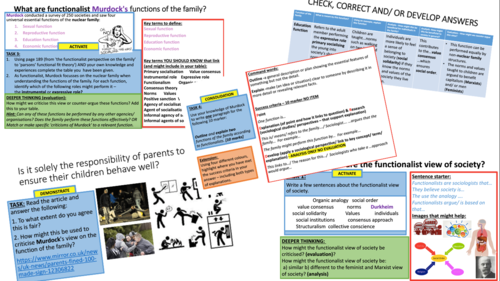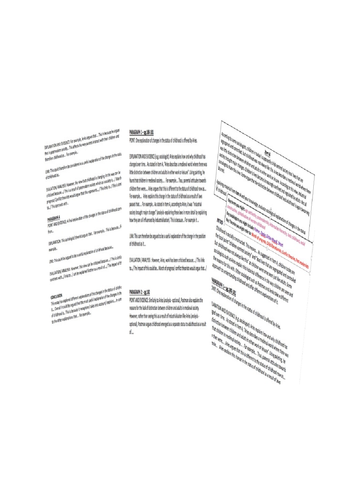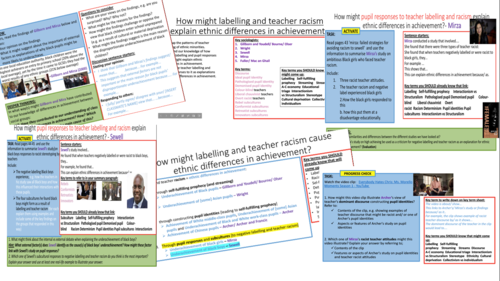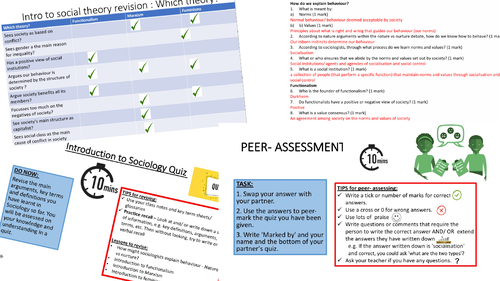
176Uploads
22k+Views
5k+Downloads
All resources
Bundle

KEY TERMS SHEET - AQA A-level Sociology Education: Topics 1-5
Alphabetical key term sheet for AQA A-level Sociology Education Topics 1-5. Contains the main key terms used in Topic 1-6 of the education unit for AQA A-level Sociology:
-Topic 1 - Class differences in achievement (external factors)
-Topic 2 - Class differences in achievement (internal factors)
-Topic 3 - Ethnic differences in achievement
-Topic 4 - Gender differences in achievement
-Topic 5 - Role of education
-Topic 6 - Education policy
*** Includes scaffolding, e.g. some sentence starters (to model to students how to incorporate key sociologists into their definitions) and prompts to help students remember how key term links to the topic. **
*** Includes a section with key terms that students should know from previous learning (for topic 3 sheet ethnic differences - this would be terms that link to key terms covered in class differences in achievement, e.g. labelling, pupil identities, material deprivation, speech codes etc) that link to this topic. **
Good form of revision for students and can be used as a revision resource to develop AO1 once filled out.
**BASED ON CONTENT textbook - AQA A Level Sociology Book One Including AS Level: Book one 3rd Revised edition by Rob Webb, Hal Westergaard, Keith Trobe, Annie Townend ’ textbook

AQA A-level Sociology Families: Theories of the family - Murdock’s four functions of the family
Detailed and differentiated (up and down) student-led lesson that recaps the functionalist view of society and examines and evaluates functionalist Murdock’s four functions: Sexual function , Reproductive function , Education function , Economic function.
Lesson makes links to other functionalist and family key terms that students might have previously been taught.
Main activity makes reference to AQA A-level Book 1 by Townsend but an alternative book that covers this content can be used.
MAIN ACTIVITY INCLUDES ANSWERS
Starter assesses prior learning on Childhood topic.
WORKSHEETS AT THE END OF THE PPT

WRITING FRAME - AQA A-level Sociology: Families – Topic 5 Changing patterns (divorce) 20 marker
Detailed writing frame that scaffolds (from introduction to conclusion) a full answer for a 20 marker on divorce (family -topic 5 changing family patterns). Models how to use the item to select points or arguments to answer the question.
*** Based on AQA specification**
Supports students with planning the 20 marker - using planning success criteria.
Outlines the success criteria and provides sentence starters for the full essay (intro, main body and conclusion). Success criteria used for paragraphs in main body of essay is PEELE/A
Outlines the key terms, sociologists, theories that can be used when answering the question.
Supports students who need support and guidance with writing essays whilst providing students who are already good at writing essays opportunities to further improve their essay skills.

WRITING FRAME - AQA A-level Sociology: Families – Topic 2 Childhood 20 marker
Detailed writing frame that scaffolds (from introduction to conclusion) a full answer for a 20 marker on divorce (family -topic 2 childhood. Models how to use the item to select points or arguments to answer the question.
*** Based on AQA specification**
*Outlines the success criteria and provides sentence starters for the full essay (intro, main body and conclusion). Success criteria used for paragraphs in main body of essay is PEELE/A
Outlines the key terms, sociologists, theories that can be used when answering the question.
Supports students who need support and guidance with writing essays whilst providing students who are already good at writing essays opportunities to further improve their essay skills.
PAGE NUMBERS From Webb et al Book 1 textbook included for 3/4 of paragraphs in main body.

WRITING FRAME - AQA A-level Sociology: Families – Topic 4 Demography (position of old) 20 marker
Detailed writing frame that scaffolds (from introduction to conclusion) a full answer for a 20 marker on whether the posiiton of the old is changing for the better. (family -topic 4 demography).
*** Based on AQA specification**
Models and students with how to use the item to answer essays.
Outlines the success criteria and provides sentence starters for the full essay (intro, main body and conclusion). Success criteria used for paragraphs in main body of essay is PEELE/A
Outlines the key terms, sociologists, theories that can be used when answering the question.
Supports students who need support and guidance with writing essays whilst providing students who are already good at writing essays opportunities to further improve their essay skills.
Bundle

PREPARING FOR THE EXAM - Family Revision and Essay Writing Bundle
Bundle includes:
Family PLC - EDITABLE - Personal Learning Checklist for the Families and Households unit in the the AQA A-level Sociology syllabus. PLC includes topic and page numbers from the Westergaard and Townsend book one for content students my find hard to locate.
Revision lessons that recaps content and/ or focusses on developing exam techniques for family topics 1-7:
-Topic 1 - Couples - also focusses on exam techniques - AO1, AO2 & AO3
-Topic 2 - Childhood
-Topic 3 - Theories of the family - focusses on AO1 & AO3
-Topic 4 - Demography - briefly focusses on all AOs but mainly AO2 for 10 markers
-Topic 5 - Changing Family patterns - focusses on AO2
-Topic 6 - Family diversity
-Topic 7 -Families and Social policy - focusses on planning essays using the item.
Five writing frames for 20 markers on family topics 2-6:
Detailed writing frame that scaffolds (from introduction to conclusion) a full answer for a 20 marker on:
-Topic 2 - Childhood - evaluate explanations of childhod
-Topic 3 - Theories of the family - whether the family is beneficial
-Topic 4 - Demography - position of the old
-Topic 5 - Changing family patterns -divorce
-Topic 6 - Family diversity - whether individual choice in personal relationships has made family life less important
Writing frames:
Supports students with planning the 20 marker (using the item) - using planning success criteria.
Outlines the success criteria and provides sentence starters for the full essay (intro, main body and conclusion). Success criteria used for paragraphs in main body of essay is PEELE/A**
-Outlines the key terms, sociologists, theories that can be used when answering the question.**
-Supports students who need support and guidance with writing essays whilst providing students who are already good at writing essays opportunities to further improve their essay skills. **

AQA A-level Sociology: Education Topic 3 Ethnic differences - Negative labelling and teacher racism
Detailed and differentiated (up and down) student led lesson that explores the following so students are able to understand and explain how negative labelling and teacher racism might cause ethnic differences in achievement:
Ideal pupil identity , Pathologised pupil identity, Demonised pupil identity, Colour-blind teachers, Liberal chauvinist teachers, Overt racist teachers, Rebels subcultures, Conformist subcultures, Retreatist subcultures, Innovators subcultures
Differentiates between Gillborn and Youdell (or Bourne or Olser), Sewell, Mirza’s view of how teachers might be racist and how this might affect achievement for different groups.
Lesson makes links to the following terms that students should have covered before completing this lesson: Labelling, Self-fulfilling prophecy, Streaming, Streams A-C economy, Educational triage, Interactionism vs Structuralism, Stereotype, Ethnicity Cultural deprivation Collectivism vs individualism.
**NOTE – Students will need to have basic to reasonable knowledge of labelling and the self-fulfilling prophecy. **
Uses and refers to ’ AQA A Level Sociology Book One Including AS Level: Book one 3rd Revised edition by Rob Webb, Hal Westergaard, Keith Trobe, Annie Townend ’ textbook
RESOURCES CAN BE FOUND AT THE END OF THE PPT.
Bundle

AQA A-level Sociology Revision lessons for family unit
Detailed and differentiated (up and down) revision lessons for each topic within the family unit of AQA specification. Includes:
Topic 1 - Couples - also focusses on exam techniques - AO1, AO2 & AO3
Topic 2 - Childhood
Topic 3 - Theories of the family - focusses on AO1 & AO3
Topic 4 - Demography - briefly focusses on all AOs but mainly AO2 for 10 markers
Topic 5 - Changing Family patterns - focusses on AO2
Topic 6 - Family diversity
Topic 7 -Families and Social policy - focusses on planning essays using the item.

Introduction to Sociology QUIZ
Includes:
small revision activity
25 min quiz (on nature vs nurture, key functionalist, Marxist, feminist’s ideas and terminology) —LESSONS CAN BE FOUND ON MAIN PAGE.
answers/ mark-scheme
scaffolding for students to peer assess (but quiz can also be marked by teacher)
Can be used for any spec
Made for A-level students but can be differentiated down for GCSE.
Bundle

AQA A-level Sociology Families: Topic 1 Couples - LESSONS, KEY TERM SHEET & REVISION LESSON
Bundle for AQA A-level Sociology Couples topic in the Families unit. Bundles includes 5 lessons, a key term sheet (for students to fill out) for the topic and a revision lesson (see below for more information on each):
**LESSONS **
Most answers to main activities included. Refers to key terms from previous lessons and units students might know that link and uses and refers to ’ AQA A Level Sociology Book One Including AS Level: Book one 3rd Revised edition by Rob Webb, Hal Westergaard, Keith Trobe, Annie Townend ’ textbook. ALL RESOURCES CAN BE FOUND AT THE END ON THE PPT
L1 - Detailed and differentiated (up and down) student-led lesson that examines and analyses the following key terms to introduce students to the main family structures: Family, Household,Family structure/ type, Nuclear family, Lone-parent family, Same-sex family, Reconstituted family (or blended family) , Beanpole family, Extend family (horizontally and vertically) , Empty-nest family, Cohabitating couples, Contemporary society, Traditional, Family diversity, Living Apart Together/ LATs (extension)
L2 - Detailed and differentiated (up and down) student-led lesson that examines and analyses the following key terms to introduce students to the traditional functionalist (Parsons) view of the domestic division of labour:
Domestic labour , Domestic division of labour, Conjugal roles
Conjugal (extension), Conjugal relationships (extension), Joint conjugal roles, Segregated conjugal roles, Instrumental role, Expressive role, Conjugal relationships (extension), Pre-industrial society (extension), Industrial Revolution (extension),
Consumption (extension)
L3 - Detailed and differentiated (up and down) student-led lesson that examines and analyses the following key terms to examine march of progress and feminist views of how women’s involvement paid work has had an impact on the domestic division of labour:
Dual‐earner couples, The New man, The ‘march of progress’ view
Double shift / dual burden, Triple shift, Emotion work, Cultural/ Ideological explanation (of segregated conjugal roles), Material/ Economic explanation (of segregated conjugal roles)
Ideology, Geographic mobility (extension), Commercialisation (extension)
Examines the ideas of :Young and Wilmott, Oakley, Hochschild , Gershuny/ Sullivan, Ferri and Smith, Crompton and Lyonette
L4 - Detailed and differentiated (up and down) student-led lesson that examines and analyses the following key terms to examine how money might be managed and how decision-making might be organised in families : Power, The allowance system, Pooling, Cultural/ Ideological explanation (of decision making), Material/ Economic explanation of inequality (of decision making),Personal life perspective (of money)
Examines the views of the following sociologists:
PAHL AND VOGLER (1993), Barret and McIntosh, Kempson, EDGELL, Laurie and Gershuny, CROMPTON AND LYONETTE, Pahl
L5 - L5 AQA A-level Families- Couples: Domestic violence
Detailed and differentiated (up and down) student-led lesson that examines and analyses the following key terms to examine patterns and explanations of domestic violence: Domestic violence/ abuse, Radical feminists, Materialism,
Marxist feminism, Radical feminist explanation (of domestic violence)
Marxist feminist explanation (of domestic violence),Materialist explanation (of domestic violence)
Examines the views of the following sociologists: Dobash and Dobash, Millet and Firestone, Wilkinson and Pickett, Ansley
**KEY TERM SHEET **
Key term sheet for AQA A-level Sociology Family Topic 1 Couples that requires students to fill out the definitions themselves. Includes some sentence starters for more difficult topics.
Good form of revision for students and can be used as a revision resource to develop AO1 once filled out.
**BASED ON CONTENT in textbook - AQA A Level Sociology Book One Including AS Level: Book one 3rd Revised edition by Rob Webb, Hal Westergaard, Keith Trobe, Annie Townend ’ textbook
**REVISION LESSON - **
Detailed and differentiated (up and down), student led lesson that teaches exam skills and recaps ‘Couples’ content of AQA specification; recaps the main sociologists and themes in the ‘Family’ unit, Topic 1 – Couples WHILST teaching students how to use the Assessment Objectives (AOs) -AO1, AO2, AO3- to further develop their answers using MODEL ANSWERS and examples.
NOTE – Students will need to have gone over or have a basic understanding of using a set success criteria or writing format for their paragraphs TO BE ABLE TO GAIN THE MOST OF OUT THIS LESSON – this lesson using set success criteria PEELE/A (for 20 markers) and PERD (for 10 markers).
**RESOURCES CAN BE FOUND AT THE END OF THE PPT.
**
**ANSWERS FOR MOST OF THE ACTIVITIES CAN BE FOUND ON NEXT SLIDE AFTER ACTIVITY SLIDE
**

AQA A-level Families- Couples: Women’s involvement in paid work
Detailed and differentiated (up and down) student-led lesson that examines and analyses the following key terms to examine march of progress and feminist views of how women’s involvement paid work has had an impact on the domestic division of labour:
Dual‐earner couples, The New man, The ‘march of progress’ view
Double shift / dual burden, Triple shift, Emotion work, Cultural/ Ideological explanation (of segregated conjugal roles), Material/ Economic explanation (of segregated conjugal roles)
Ideology, Geographic mobility (extension), Commercialisation (extension)
Examines the ideas of :Young and Wilmott, Oakley, Hochschild , Gershuny/ Sullivan, Ferri and Smith, Crompton and Lyonette
***** Makes reference to other key terms students might know that link. **
****ALL RESOURCES INCLUDED AND CAN BE FOUND OUT THE END OF PPT ***
Uses and refers to ’ AQA A Level Sociology Book One Including AS Level: Book one 3rd Revised edition by Rob Webb, Hal Westergaard, Keith Trobe, Annie Townend ’ textbook

L5 AQA A-level Families- Couples: Domestic violence
Detailed and differentiated (up and down) student-led lesson that examines and analyses the following key terms to examine patterns and explanations of domestic violence: Domestic violence/ abuse, Radical feminists, Materialism,
Marxist feminism, Radical feminist explanation (of domestic violence)
Marxist feminist explanation (of domestic violence),Materialist explanation (of domestic violence)
Examines the views of the following sociologists: Dobash and Dobash, Millet and Firestone, Wilkinson and Pickett, Ansley
***** Makes reference to other key terms students might know that link. **
***** ANSWERS to MAIN activities INCLUDED****
Uses and refers to ’ AQA A Level Sociology Book One Including AS Level: Book one 3rd Revised edition by Rob Webb, Hal Westergaard, Keith Trobe, Annie Townend ’ textbook

AQA A-level Families- Couples: Intro to the family structures/ types
Detailed and differentiated (up and down) student-led lesson that examines and analyses the following key terms to introduce students to the main family structures: Family, Household,Family structure/ type, Nuclear family, Lone-parent family, Same-sex family, Reconstituted family (or blended family) , Beanpole family, Extend family (horizontally and vertically) , Empty-nest family, Cohabitating couples, Contemporary society, Traditional, Family diversity, Living Apart Together/ LATs (extension)
***** ANSWERS for MOST MAIN activities INCLUDED****
***** ALL RESOURCES INCLUDED AND CAN BE FOUND OUT THE END OF PPT *****

AQA A-level Families- Couples: Traditional views of the domestic division of labour
Detailed and differentiated (up and down) student-led lesson that examines and analyses the following key terms to introduce students to the traditional functionalist (Parsons) view of the domestic division of labour :
Domestic labour , Domestic division of labour, Conjugal roles
Conjugal (extension), Conjugal relationships (extension), Joint conjugal roles, Segregated conjugal roles, Instrumental role, Expressive role, Conjugal relationships (extension), Pre-industrial society (extension), Industrial Revolution (extension),
Consumption (extension)
***** Makes reference to other key terms students might know that link. *****
***** ANSWERS for MAIN activities INCLUDED****
***** ALL RESOURCES INCLUDED AND CAN BE FOUND OUT THE END OF PPT *****

AQA A-level Sociology Education Topic 5 Role of education - The New Right view
Detailed student led lesson on the New Right critique and view of the purpose state education adapted to stretch and challenge the most able whilst scaffolding to allow pupils who need support the opportunity to access higher level thinking.
Covers the following key terms:
Neo-liberalism
The New Right
Conservatives
Voucher system
One-size-fits-all approach
League tables
Ofsted reports
National curriculum
Marketisation
Privatisation
Academies
Free schools
State schools
Social policies
Covers the following key sociologists: Chubb and Moe
Uses and refers to ’AQA A Level Sociology Book One Including AS Level: Book one 3rd Revised edition by Rob Webb, Hal Westergaard, Keith Trobe, Annie Townend ’ textbook
BRIEF ANSWERS TO THE MAIN ACTIVITY INCLUDED
NOTES -RESOURCES CAN BE FOUND AT THE END OF THE PPT.

AQA A-LEVEL SOCIOLOGY: Learning Journal -Exam Skills, Techniques and Revision Support Booklet (V1)
Detailed student SKILLS booklet that models and provides guidance on how to develop exam skills (AO1, AO2 & AO3) and how to use these to answer the different exam questions in the AQA A-level Papers (4, 6, 10, 20 & 30 markers). 40 page pdf document provides success criteria for the different exam questions with a model answer for each (20 and 30 markers have the same model answer – booklet specifies difference between the two), techniques for further improving answers once students are able to meet the success criteria for each exam question (A*-A answers), tips and suggestions to support and promote independent revision outside of class lessons, revision websites and channels, and podcast and a reading list to develop student’s knowledge outside of the topic.
Includes the following:
Help sheet – including the main issues students have and steps to take to tackles these; develops independence
Contents page - to help students navigate booklet
Course overview –written out for family, education, media, theory and methods (sepearately and combined), methods in context and crime ***EDITABLE COURSE OVERVIEW DOCUMENT– to allow you to edit the units you teach
Personal Learning Checklist (PLCs) for the following: Education, Methods in context, ‘Theory and methods’ (separate and combined versions), Family, Media, Beliefs and Crime - **PLCS APART FROM BELIEFS AND CRIME HAVE PAGE NUMBERS ** -for the Ken Brown textbook for media and Webb et al Book 1 and 2 for the rest .
Assessment Objectives – information on these and how to develop these skills in lessons and outside of lesson.
Exam questions – Success criteria, sentence starters, links to AOs and MODEL ANSWERS for each exam question -4 & 6 markers 10 markers 20 & 30 markers
Success criteria NOTE - ‘(D)’ IN PEELE/A (D) stands for Develop (which means to evaluate and/ or analyse) - so paragraph success criteria can be PEELE/A (I use for year 12) or PEELD (for year 13)
Further developing your answers – how to further develop answers using the AOs, improving explanation, analysis, evaluation and links - INCLUDES MODEL EXAMPLES.
Focusses on:
• Improving your explanations
• Improving your analysis
• Improving your criticisms
• Going beyond PEELE – Demonstrating more AOs
• Going beyond PEELE – Make more use of ‘Links’ to improve AO2
Other resources that might help – YouTube websites, Podcast and revision websites
Developing sociological skills outside the lesson -mind-map for umbrella theories (yr 12 – consensus vs conflict, modernism vs postmodernism structural vs interactionism in relation to functionalism, Marxism, Feminism Personal life perspective), reading list that explores sociological themes learnt throughout the course.
**BOOKLET (apart from ‘Course overview’ NOT EDITABLE - PDF DOCUMENT
**

GCSE Intro to Sociology QUIZ
Includes:
small revision activity –that looks at the similarities and differences between functionalism, Marxism and feminism
25 min quiz (on basic sociological concepts, key functionalist, Marxist, feminist’s ideas and terminology)
answers/ mark-scheme for quiz
scaffolding for students to peer assess (but quiz can also be marked by teacher)
SAME as A-level intro quiz but excludes questions on the nature – nurture debate.
Can be used for any spec

AQA GCSE Sociology - Research Methods: What PET issues might sociologists consider for research?
Detailed lesson with lots of scaffolding based on adaptive teaching that help students understand what are PET issues that sociologists consider when designing and conducting research (e.g. define and identify possible practical, ethical and theoretical (PET) advantages and disadvantages of social research and explaining PET’s differences
Covers the following key terms: Practical issue, Ethical issues, Theoretical issues,Anonymity, Confidentiality , Informed consent, Covert research (extension), Pseudonym (extension), Mixed method (extension) Findings (of research) (extension).
Key bodies, laws and theories we will cover: British Sociological Association, Data Protection Act 1998, Positivism, Interpretivism
Answers to most main activities are included
Resources can be found at the end of the PPT

AQA GCSE Sociology - Research Methods: Questionnaires
Detailed lesson with lots of scaffolding based on adaptive teaching that help students understand how to use questionnaires when investigating sociological issues (e.g. the main features of questions and describe when its appropriate to use, the strengths and weaknesses of questionnaires based on their main features and how to apply our knowledge of the strengths and weaknesses of questionnaires to different sociological research topic.
Examines questionnaires in general and postal questionnaires.
Makes links to practical ethical and theoretical issues.
Covers the following key terms: Questionnaires, Postal questionnaires
Key terms you should know that link:
Quantitative data vs Qualitative data – Reliable vs Valid – Practical issues – Ethical issues – Theoretical issues – Positivism vs Interpretivist – Sample size – Representative sample – Generalise findings - Social surveys – Questionnaire - Pre-determined - Closed questions - Open questions - Postal questionnaires - Online questionnaire
INCLUDES ANSWERS FOR ACTIVITIES
Includes model answer, student friendly mark-scheme and example answers ranging from 1-4/ 4 for a research method 4 marker
RESOURCES CAN BE FOUND AT THE END OF PPT

AQA GCSE Sociology - Research methods: Social surveys
Detailed lesson with lots of scaffolding based on adaptive teaching that help students understand what are the strengths and weaknesses of using social surveys to investigate sociological issues (e.g how to identify the main features of social surveys and when it would be appropriate to use them, explains the strengths and weaknesses of using social surveys to investigate social issues and applies the strengths and weaknesses of social surveys to an exam question).
Covers the following key terms: Social surveys, Telephone surveys
Makes references to key terms students should know that link to this lesson.
Lesson requires students to have prior knowledge of practical, ethical and theoretical issues to the strengths and weaknesses of social surveys
No starter included in the lesson
ANSWERS TO MAIN ACTIVITY ONLY.
Includes an exam question with scaffolding to help students answer.
I used the lesson as an opportunity to write an answer to the 4 marker with students.
Resources can be found at the end of PPT




















